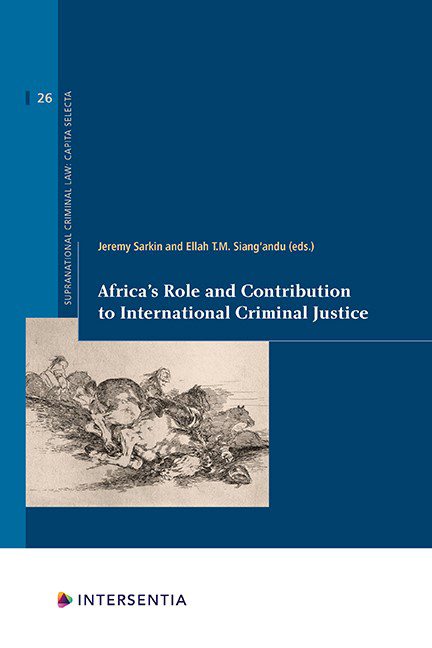Book contents
- Frontmatter
- Acknowledgements
- Contents
- List of Contributors
- Introduction: Understanding the Meaning, Context, Role and Importance of African Criminal Justice on the Continent and Beyond
- Types of International Criminal Courts in Africa
- The Extraordinary African Chambers in the Senegalese Courts and the Development of International Criminal Law in Africa
- The Use of International Criminal Law in African Countries
- The Nuremberg Principles in the Context of Africa: The Theory and Practice of Individual and Corporate Criminal Responsibility
- The Application of Universal Jurisdiction in Africa
- African Victims of Mass Atrocities Before Domestic Jurisdictions and the International Criminal Court: Bargaining for Justice
- The Role of the International Criminal Court in Africa: The Epic Fails?
- Is the African Court on Human and Peoples’ Rights with Criminal Jurisdiction an African Solution to an African Problem?
- Head of State Immunity in the African Context
- Index
The Extraordinary African Chambers in the Senegalese Courts and the Development of International Criminal Law in Africa
Published online by Cambridge University Press: 11 February 2021
- Frontmatter
- Acknowledgements
- Contents
- List of Contributors
- Introduction: Understanding the Meaning, Context, Role and Importance of African Criminal Justice on the Continent and Beyond
- Types of International Criminal Courts in Africa
- The Extraordinary African Chambers in the Senegalese Courts and the Development of International Criminal Law in Africa
- The Use of International Criminal Law in African Countries
- The Nuremberg Principles in the Context of Africa: The Theory and Practice of Individual and Corporate Criminal Responsibility
- The Application of Universal Jurisdiction in Africa
- African Victims of Mass Atrocities Before Domestic Jurisdictions and the International Criminal Court: Bargaining for Justice
- The Role of the International Criminal Court in Africa: The Epic Fails?
- Is the African Court on Human and Peoples’ Rights with Criminal Jurisdiction an African Solution to an African Problem?
- Head of State Immunity in the African Context
- Index
Summary
INTRODUCTION
Between 7 June 1982 and 1 December 1990, Chad was ruled by the dictator Hissène Habré, who implemented one of the most repressive regimes in Africa in modern history. According to the findings of the Commission of Inquiry into Crimes and Misappropriations Committed by former President Habré and his accomplices, during his tenure in power, there were around 40,000 victims of political assassinations and systematic torture. Exiled to Senegal, Habré was not held accountable for his crimes for a number of years. However, the quest for justice pursued by victims and their lawyers in national and international fora, among other factors, made Senegal finally honour its international obligations to try those responsible for international crimes. This process involved both the Court of Justice of the Economic Community of West African States (hereinafter the ECOWAS Court of Justice), which found that Habré needed to be tried under ‘a special ad-hoc procedure of an international character’, and the International Court of Justice (ICJ), which ordered Senegal to prosecute or extradite Habré without further delay.
In successfully implementing and completing these judicial steps, the African Union (AU) played a pivotal role. The Extraordinary African Chambers in the Senegalese courts (EAC) were set up following an agreement between the AU and Senegal on 8 February 2013, which contains the EAC Statute as an annex. The EAC was given the mandate to prosecute those most responsible for international crimes, under customary international law and conventions ratified by Chad and Senegal, for crimes perpetrated in Chad from 7 June 1982 to 1 December 1990, namely during the years that Habré was in power in Chad. On 30 May 2016, the EAC Trial Chamber convicted Habré of: (i) crimes against humanity, in particular rape, sexual slavery, murder, summary execution, enforced disappearance, torture and inhumane acts; (ii) torture as an autonomous crime; and (iii) war crimes, in particular murder, torture, cruel, inhumane treatment and unlawful confinement of prisoners of war. This conviction was largely ratified by the EAC Appeals Chamber on 27 April 2017. As confirmed on appeal, Habré's conviction marked the closure of the EAC, except for the ongoing process of implementing the reparation award ordered by the EAC.
- Type
- Chapter
- Information
- Publisher: IntersentiaPrint publication year: 2020



